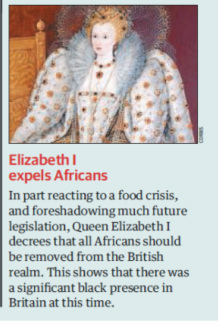 from the Guardian Black History Timeline
from the Guardian Black History Timeline This is perhaps the most oft-quoted (sometimes the only quoted) "fact" relating to the history of Africans in Tudor England. Recently, I have seen it repeated in the Guardian Black History timeline, the Medieval POC tumblr, and the New York Times.
It has also been peddled by historians, including the wonderful Peter Fryer, who wrote in his magisterial Staying Power in 1984: “The queen was soon expressing strong disapproval of the presence of black people…in the realm and indeed, ordering that ‘those kinde of people’ should be deported forthwith.” While Ania Loomba went so far as to assert in 1992 that “Elizabeth I's communique deporting blacks... [indicates that] the 'preservation' of the white race is seen to be at stake.”
It's a prime example of how anything can become "fact" through repetition. and it is a particularly dangerous story to peddle in our immigration- obsessed times. It is all too easy to elide the centuries and imagine that Elizabeth I had an immigration policy that would have been approved of by Enoch Powell.
The "fact" has made its way into the classroom. In 2009 year 7 pupils at St John Plessington Catholic College in the Wirral were to be taught: “To understand the reasons for Elizabeth I’s policy of expulsion”, while the BlackHistory4Schools website has a lesson plan which explicitly compares the Tudor rhetoric with modern newspaper headlines.
What makes this all worse, on a personal level, is that I wrote an article disproving this so-called "fact" some seven years ago. Clearly, academic articles are not as widely read as academics might like. And looking back, I can see it is a bit dense. Maybe "Caspar van Senden, Sir Thomas Sherley and the ‘Blackamoor’ Project" wasn't the most catchy title?
Anyway, now I'm taking to my blog to explain the truth behind the myth once and for all, in plain terms (but still with some original quotes!).
So, What really happened?
Well, on 18 July 1596, the Privy Council issued an open letter addressed “to the Lord Mayor of London and to all vice-admirals, Mayors and other public officers whatsoever to whom it may appertain.” The letter authorised a merchant of Lubeck named Caspar Van Senden to “take up…Blackamoores here in this Realm and to transport them into Spain and Portugal.”
Crucially this required the "consent of their masters.” It was this requirement that made this a dead letter, as I learnt from reading the various petitions from a disappointed Van Senden amongst Robert Cecil’s papers. In an undated petition to the Queen, Van Senden asks for a far more powerful authorisation to take Africans out of the country, without the "interruption of their masters or any other persons." He complains that the 1596 Council warrant was not effective as he:
"together with a Pursivant [basically an enforcer] did travell at his great Charges into dyvers partes of your highness Realme for the said Blackamoores, But the masters of them, perceiving by the said warrant that your orator could not take the Blackamoores without the Master’s good will, would not suffer your Orator to have any one of them."
Van Senden did not get what he wanted. Another document of 1601 has been quoted as a second Privy Council letter or proclamation, but in fact it was never promulgated, and only exists as a draft amongst Cecil’s papers. It might have been drafted by Van Senden himself, as it is more strongly worded that the 1596 letter.
Ultimately Van Senden's schemes were unsuccessful. This was not a deportation, but rather a small-scale bargain with a persistent merchant, on an individual basis. Van Senden was supported by the bankrupt, probably Catholic, Sir Thom
Elizabeth I did not expel Africans from England. In fact, Africans, who had been present in both England and Scotland from the earliest years of the sixteenth century, continued to live here for the rest of her reign, and beyond. I have found evidence of over 360 African individuals living in these isles between 1500 and 1640. We no longer need to rely on the 1596 document to make the point that there were Africans in Tudor England.
Since writing this blog, an excellent new article has been published on the subject by Emily Weissbourd. Read it here.
 RSS Feed
RSS Feed
